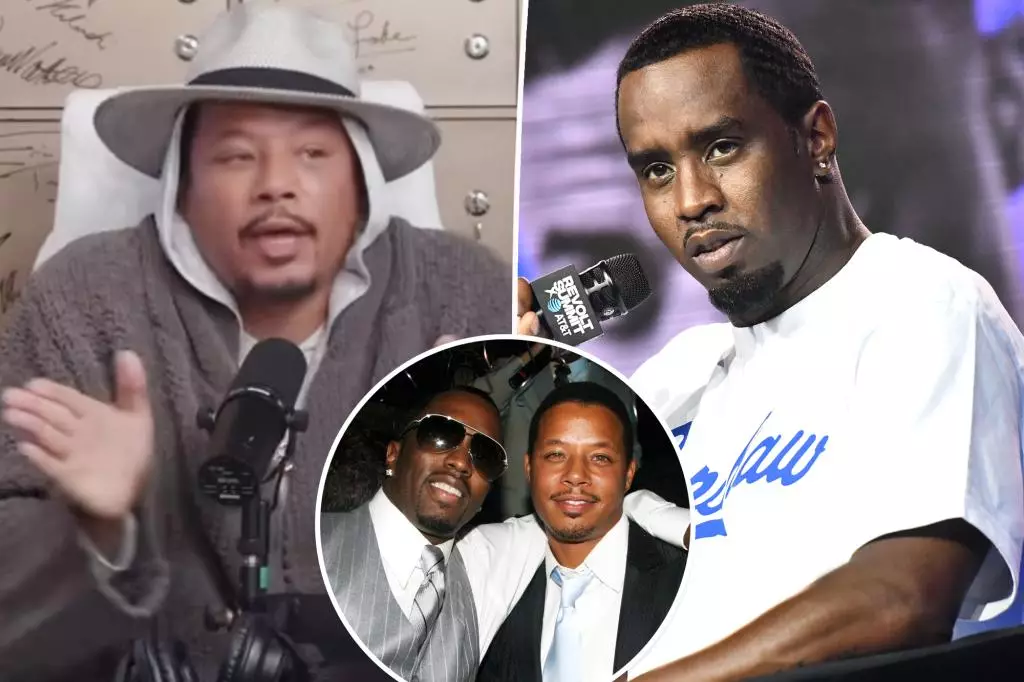In a world where the glitz and glamour of Hollywood often blind viewers to darker realities, Terrence Howard has thrust a disturbing narrative into the spotlight with his recent allegations against Sean “Diddy” Combs. During an appearance on the “PBD Podcast,” Howard made shocking claims about the Bad Boy Records founder, suggesting that Diddy not only sought his expertise as an acting coach but also harbored inappropriate intentions. As the entertainment industry grapples with systemic issues of power dynamics and alleged misconduct, Howard’s assertions ignite a crucial conversation on the pervasive problem of sexual coercion within its ranks.
The 56-year-old actor’s claims illustrate a troubling culture that, while masked by the allure of fame, often fosters predatory behavior and exploitation. Howard describes how Diddy would invite him over to discuss acting but instead would sit idly, merely observing him—a behavior that took an unsettling turn with his assistant’s stark observation. “I think he’s trying to f*** you,” Howard recalls being told, leading him to sever ties with Diddy. These allegations call into question the dynamics at play when a powerhouse figure like Diddy leverages his status in pursuit of personal desires.
The Masculinity Quandary in Hollywood
In Howard’s assertions lies a broader commentary on perceptions of masculinity within the entertainment sector. The actor adamantly states, “I don’t bend over in that way. I don’t compromise.” This sentiment echoes a reflection of numerous actors who often find themselves at the intersection of professional aspirations and personal integrity. Howard’s aversion to playing gay roles or engaging in intimate scenes with male actors raises a provocative dialogue about the nature of masculinity in Hollywood—an industry where the stakes for success can push individuals to compromise their values or identities.
However, this viewpoint also leans into problematic territory. While asserting one’s masculinity is vital, the rigid confines of traditional masculinity can equally perpetuate shame and silencing within the community. The need for men to conform to these often harmful expectations can lead to a culture of silence surrounding sexual harassment and exploitation. Howard’s experiences showcase how the fear of losing one’s ‘man card’ can lead to isolation in an industry that often demands conformity at the expense of personal authenticity.
Accusations Against a Powerful Titan
Interestingly, Howard is not the first to speak out against Diddy. Although accusations from big-name celebrities in the music and film industries remain scant, the shadows of the famed mogul are long, and they carry ominous weight. Recently, reports emerged about numerous individuals—many who are not public figures—coming forward to allege instances of sexual misconduct and trafficking orchestrated by Diddy. These allegations are corroborated by Joseph Manzaro, who has claimed that the rapper engaged in trafficking and other forms of sexual violence.
Diddy’s swift rebuttal against these claims, characterizing them as outrageous fabrications designed for financial gain, illustrates the defensive posture often adopted by powerful figures when accused of misconduct. His denial, while a standard response, further raises the tension between authority and accountability. Individuals in positions of power frequently wield their influence to discredit those brave enough to voice their experiences, creating a chilling effect that deters discussions that should be happening openly.
The Ripple Effects of Silence and Fear
The entertainment industry has long been labeled a “boys’ club,” wherein silence is coerced through the fear of retribution or loss of career opportunities. Howard’s boldness in making claims against Diddy, who is currently grappling with federal sex trafficking charges, emphasizes the necessity for more individuals to share their stories. By breaking this long-standing silence, there may be hope for fostering an environment where accountability takes precedence over fame.
Yet, even as some choose to speak out, others remain in the shadows, afraid of the potential backlash or damage to their careers. The societal pressures that inhibit individuals from sharing their experiences are not simply personal dilemmas; they reflect deeply embedded systemic issues that need change. It is this very silence that perpetuates cycles of abuse and exploitation, creating a hazardous landscape for both emerging artists and established stars alike.
Terrence Howard’s revelations serve as a powerful reminder that the allure of fame often masks troubling truths. While the industry celebrates its successes, it must also address the dark themes that accompany its glittering facade. The culture of silence, fear, and denial ultimately benefits no one, and it is high time for a reckoning that allows the voiceless to find their strength. Through robust conversations and courageous testimonies, there lies the opportunity for transformative change that can redefine the power structures built within Hollywood.

